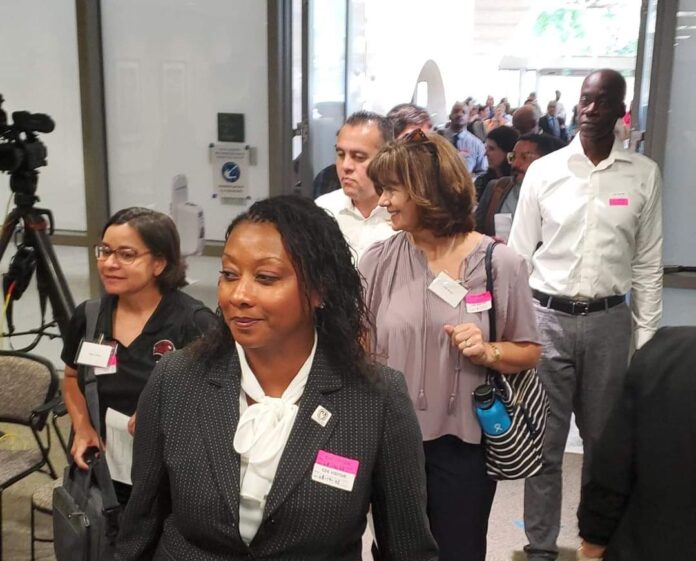
By Joe W. Bowers Jr., California Black Media
Recently, Gov. Gavin Newsom conducted press briefings at Sacramento area public schools to talk about the initiatives he’s supporting to reform and revolutionize public education in California.
At the Miwok Village Elementary School in the Elk Grove Unified School District, Newsom promoted his “California’s Family Agenda,” a public-school initiative that aims to provide students with the right environment and opportunities for growth, learning, and success.
At River City High School in the Washington Unified School District, Newsom signed an executive order that initiates the development of a Master Plan on Career Education to prepare students for future careers, including those that don’t require college degrees.
Newsom has made K-12 education a top priority. Among his accomplishments are increased funding to reduce class size, the hiring of more teachers, providing more resources for students; and universal transitional kindergarten. The Governor has also expanded afterschool and summer programs, especially support for student tutoring; universal free school meals; full-service community schools; and ethnic studies in high school.
While Newsom has tried to improve equity and outcomes for all students, a comprehensive survey titled “California Black Voters Perspectives on the Quality of Education for Black Students” commissioned by the Black in School Coalition (BISC) found that only 27% of Black voters agree that Newsom is doing enough to improve educational outcomes for Black students.
The BISC is a statewide organization dedicated to enhancing academic and social outcomes for Black students in California. Their statewide survey of 1,200 Black voters gauges Black voter viewpoints on education funding, school performance, and major challenges confronting Black students. Insight from the survey provides valuable information for policymakers, educators, and other stakeholders to develop more effective programs to enhance the educational experience of Black students.
Newsom’s Family Agenda is centered around four freedoms: Freedom to Decide, Freedom to Thrive, Freedom to Learn, and Freedom to Succeed. It includes initiatives to invest in community schools and high schools with specialized career and trade pathways. It provides parents and students with access to high-quality instruction, wraparound services, and social assistance.
“We believe in parents’ rights to decide and support their kids. We believe that kids have the right to learn and the right to succeed. And that’s what our agenda lays out,” Newsom said.
Newsom’s Master Plan on Career Education aims to strengthen career pathways, prioritize practical learning, and promote universal access and affordability through collaboration across government and the private sector.
“California is leveraging billions of dollars in investments to prepare students and workers for good-paying, long-lasting, and fulfilling careers,” Newsom announced.
Attending the press conference in support of the Career Education Master Plan were State Superintendent of Public Instruction Tony Thurmond, University of California President Michael Drake, Cal State Chancellor Mildred Garcia, CA Community College Chancellor Sonya Christian, and other state officials and legislators.
But Newsom failed to highlight in the press conferences how his education initiatives will tackle concerns Black voters have regarding the quality of education Black students are receiving.
Black students remain the lowest performing academic subgroup in California public schools despite Newsom’s efforts. Seventy percent of Black students are not meeting English language arts standards, and 84% are not meeting math standards. Black students are disproportionately suspended and expelled from school. In the 2021-22 academic year, Black students, who made up 10.7% of the student population, accounted for 23.3% of suspensions and 19.1% of expulsions. The disparity is most pronounced in early childhood education, where Black male students are 6.2 times more likely to be suspended than their peers of other races.
Despite the ongoing challenges, there have been encouraging advancements for Black students under Newsom’s leadership. This year’s budget includes an ongoing funding of $300 Million called the Equity Multiplier to fulfill a commitment he made to Assemblymember Akilah Weber (D-La Mesa) who introduced a bill which would have provided more money for Black K-12 students.
Margaret Fortune, the President and CEO of the Fortune School of Education and a leader of BISC, has expressed concerns about Newsom’s plan for distributing Equity Multiplier funds. She argues it deviates from Weber’s bill intent by directing the funding towards high-poverty schools instead of specifically towards Black students. The funding protocol appears to undermine the bill’s intent, with BISC analyses showing that only 11% of the funds are benefiting Black students.
Seventy-nine percent of respondents in the BISC survey supports a legislative proposal to change the public-school funding formula by creating a new grant for California’s lowest performing subgroups, including Black students.
Fortune told California Black Media (CBM) that she will be pushing in for the Equity Multiplier in future state budgets to be based on academic achievement, not on income. “It is a permanent part of our funding mechanism in California, there’s an opportunity to have that conversation,” Fortune said.
Newsom’s office told CBM that it would not comment on the BISC poll because it has not obtained access to its underlying methodology and a breakdown of its results. They stated, “The Governor’s sweeping initiatives to improve equity in education and ensure Black children and families succeed have received strong praise and wide recognition from Black leaders across the state – including the California Legislative Black Caucus and academic leaders including the California Association of African American Superintendents and Administrators.”
In the BISC survey, 48% of respondents do not believe that the California Legislature is working hard to improve education for Black students.
While Newsom and the Legislature, especially the California Legislative Black Caucus, have supported initiatives aimed at improving educational outcomes for Black students, Black voters and Black education advocates believe they are not specific enough and fail to consider the unique needs of Black students.
About the Author
Joe W. Bowers Jr. is a contributing editor to California Black Media. He is a graduate of Stanford University.


